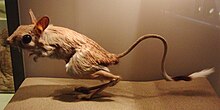Dipodidae
family of mammals
The Dipodidae are a family of small to medium-sized rodents living in the northern hemisphere. The family has over 50 species in 16 genera.
| Dipodidae Temporal range:
| |
|---|---|

| |
| Jaculus orientalis | |
| Scientific classification | |
| Domain: | Eukaryota |
| Kingdom: | Animalia |
| Phylum: | Chordata |
| Class: | Mammalia |
| Order: | Rodentia |
| Suborder: | Myomorpha |
| Superfamily: | Dipodoidea |
| Family: | Dipodidae Fischer de Waldheim, 1817 |
| Subfamilies | |
|
Allactaginae | |
They include the jerboas, jumping mice, and birch mice. Different species are found in grassland, deserts, and forests. They are all capable of saltation, which is jumping from a bipedal stance. This feature is most highly evolved in the desert-dwelling jerboas. Their movement resembles that of kangaroos more than that of true mice.
Most species are nocturnal, and the eyes and ears are noticeably larger than usual in proportion to the body.
References
change- ↑ Qian Li; Yan-Xin Gong; Yuan-Qing Wang (2017). "New dipodid rodents from the Late Eocene of Erden Obo (Nei Mongol, China)". Historical Biology: An International Journal of Paleobiology. 29 (5): 692–703. doi:10.1080/08912963.2016.1232406. S2CID 132602246.